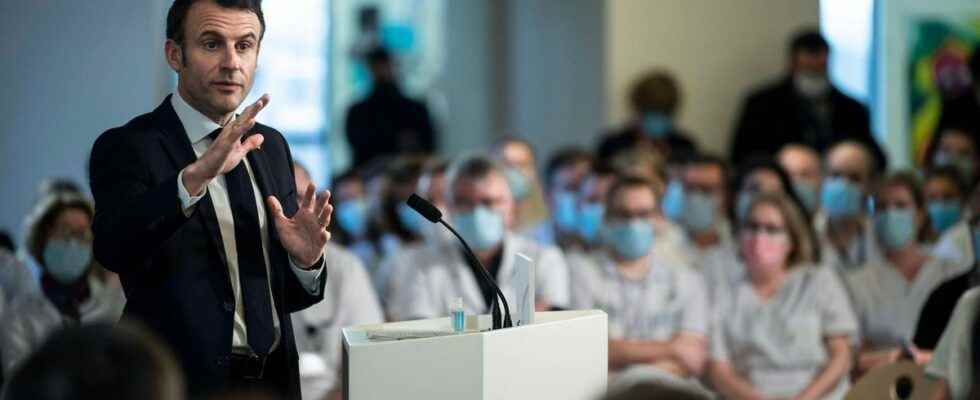Published on
Updated
Reading 3 mins.
At the end of his wishes to health actors, presented on January 6 from a hospital in Corbeil-Essonne, President Emmanuel Macron spoke of his measures intended to respond to the difficulties of a suffering sector. Measures that are not unanimous.
Faced with a health sector in crisis which awaits action, Emmanuel Macron had announced decisions, on the sidelines of this Friday, January 6. “Very concrete measures, with precise and close review clauses to ensure their execution” had assured the Elysée. It was during a visit to a hospital in Essonne, at the bedside of caregivers this morning, that he held a conference to present a set of solutions. In order to get out of an endless crisis, the Head of State announces that he wants to “go much faster, much stronger and make radical decisions”.
“Review the hyper-rigidity of the 35 hours”, “give time back to care”: the measures mentioned by Macron
- Among the announcements mentioned at the end of his wishes to caregivers, Emmanuel Macron announced that he wanted to rethink the organization of working time in the hospital, and above all “to flatten” the current system by June, in order to “rebuild a system that is objectively more consistent with the reality of your daily life”. According to him, the hospital is the last place where the 35 hours still work, “with a hyper rigidity deploring a system that only works through overtime.”
- Another urgency according to the Head of State, that of clearing “time“Useful for medicine and care. For this, he wishes “accelerate the recruitment of medical assistants for doctors” which would aim to relieve caregivers of administrative tasks through the creation of tandem work. These assistants will grow from around 4,000 today to 10,000 by the end of 2024.
- The president also wants to get out of activity-based pricing as of the next Social Security financing bill in 2023, to go “towards new funding based on remuneration based on public health objectives”.
- The Head of State also announced better remuneration for “doctors who provide ongoing care and those who take on new patients”.
- Finally, citing an aging population, the President announces that “600,000 patients with a chronic disease will be offered a general practitioner by the end of the year”.
Emmanuel Macron, however, warned that an improvement will take time. “We are in a situation that is likely to deteriorate” he added cautiously, recalling that “almost half of doctors today are over 60” and that training a new generation of caregivers will take years. Despite the end of the numerus clausus, “we do not train doctors in one or two years”.
Caregivers unconvinced by the President’s announcements
The reactions following Emmanuel Macron’s speech were not long in coming; ”What we are waiting for now are actions”, can we read on the networks. On France Info, Agnès Ricard Ricard-Hibon, spokesperson for the French Society of Emergency Medicine, welcomes “ads that go in the right direction”but specifies that “many of the solutions that are proposed were already in the 2019 emergency refoundation pact”.
For Professor Jean-Luc Jouve, pediatric surgeon at the Marseille Hospitals Public Assistance: “We are not even at the level of the patch”.
He recognizes that the formation of an administrative doctor tandem at the head of hospitals is a good idea, “but which will not make it possible to manage the structural problems of the hospital”.
Contacted by Doctissimo, Dr. Patrick Pelloux, president of the association of emergency physicians in France, even tells us about “despair” in front of a number that he considers warmed up and staged.
“Nothing in what Emmanuel Macron has announced will be able to resolve the tensions, from the moment he is self-satisfied with what has not been done so far.” The doctor thus severely judges each announcement made: “The end of the numerus clausus is a lie, the selection is now worse than before. He also dares to bring out the eternal argument of the fault of the 35 hours, whereas the 48,000 jobs which were to be created thanks to the 35 hours, have never been. As for the end of activity-based pricing, it was already part of its program in 2017”.
The doctor also notes that the presidential address did not mention any numbers: “The President did not talk about money, or salary increases, he did not mention any figures. Another way to discredit the words of caregivers? ” he wonders.
